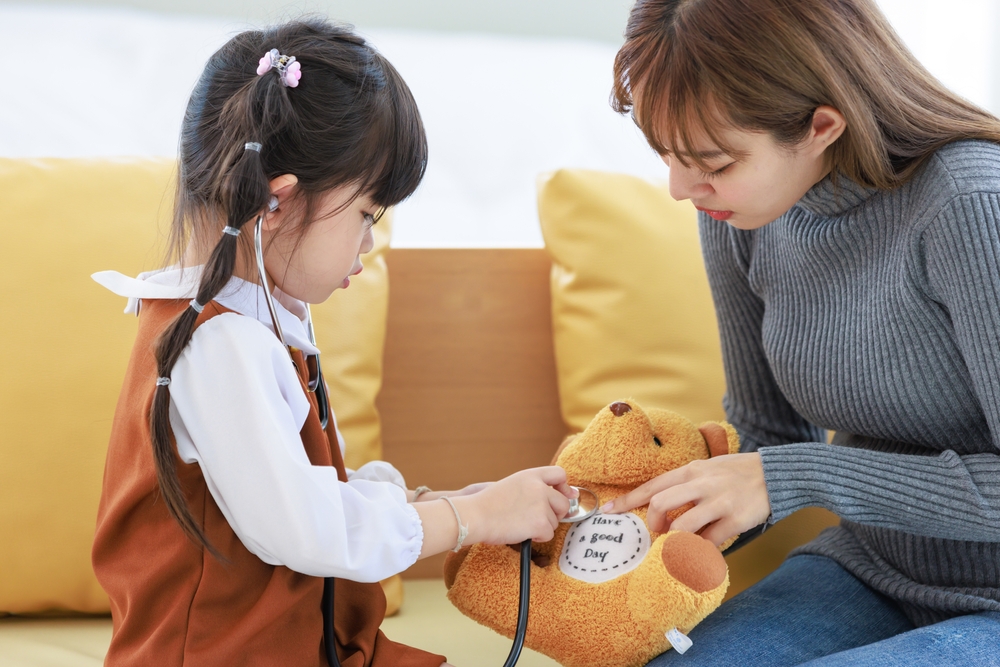”Play is a natural part of childhood and acts as a vital role in a child’s social and emotional development. Erik Erikson, an expert in human growth and development, defines play as a “situation in which a child can work through experiences by creating model situations and master reality through planning and experimentation.”
Play-based approaches to therapy can take many forms, depending on the child’s age, interests, and needs. For younger children, play therapy may involve toys, dolls, or puppets, while older children may engage in role-playing, art, or other creative activities.
Play-based approaches can also be used in group therapy, where children can practice social skills and build connections with other children. Play therapy, or imaginative play therapy, is defined as the “systematic use of a theoretical model that establishes an interpersonal process, in which trained therapists use the therapeutic powers of play to help children prevent or resolve psychosocial difficulties and achieve optimal growth and development.” Play-based approaches to therapy help kids heal in several ways, such as:
- Encourages creativity and positive decision-making: Research has identified that an important benefit of early pretend play is “its enhancement of a child’s capacity for cognitive flexibility and, ultimately, creativity.” Play therapy promotes creativity by providing a safe space for children to have the autonomy to act out scenarios of their choosing and engage in symbolic play.
- Boosts emotional awareness: The British Association of Play Therapists (BAPT) asserts that through play therapy children can sort through complicated feelings and emotions without feeling interrogated or threatened by relying on play to communicate at their own level and at their own pace.
- Promotes healthy social interaction: Through play therapy, children learn to communicate with others, express feelings, modify behavior, develop problem-solving skills, and learn a variety of ways of relating to others.
- Nurtures empathy: Through play, children learn to follow norms and how to cultivate empathy and respect for the thoughts and feelings of others.
- Strengthens self-esteem: Play-based approaches to therapy can help kids develop a sense of competence and mastery, which can boost their self-esteem. By engaging in activities that they enjoy and that challenge them, children can build a sense of accomplishment and pride.
Play is an instinctive behavior for children, and it allows them to express themselves and make sense of the world around them. The role of play in therapy is to help children heal and grow by providing a safe, supportive, and engaging environment in which they can explore and process their emotions, thoughts, and experiences. Through play-based approaches, children can learn to identify and express their feelings, build resilience and coping skills, and develop a greater sense of self-awareness.
Further Information and Support
For most of us, life can be very stressful, leading us to feel emotionally charged, which can cause anxiety, panic attacks, depression, and getting stuck in a cycle of being burdened with negative thoughts. Navigating through the challenges and emotional turmoil of life can be overwhelming, but you do not have to go through it alone. Engage Treatment is a Joint Commission Accredited professional psychological practice. We specialize in treating children, teens, and young adults struggling with depression and anxiety through community-focused treatment plans that incorporate a carefully selected combination of therapeutic interventions. Our compassionate, multidisciplinary practitioners are devoted to providing the highest quality of care that helps ignite positive change and enables clients to reach optimal health and well-being. Please do not hesitate to reach out for guidance. We are happy to answer questions and provide you with any additional information. Feel free to call us at 805-497-0605 or email us at [email protected]. You are also welcomed to get in touch by filling out our contact form. We look forward to connecting and having the opportunity to discuss how we might best be able to support you.
Contact Us
Westlake Campus:
IOP Program
2625 Townsgate Road, Suite 210
Westlake Village, California 91361
Agoura Campus:
Private Therapy & Parenting Program
30300 Agoura Road, Suite 250
Agoura Hills, CA 91301
805-497-0605
805-371-4862











© 2023 Engage Treatment Program, Inc. All Rights Reserved.
LGBTQ Friendly
About
• About Engage
• Our Team
• Career Opportunities
• Individual / Family Therapy






